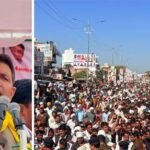New Delhi, July 5 (UNI) Prime Minister Narendra Modi will be in Brazil tomorrow to attend the 17th BRICS Summit at Rio de Janeiro (July 6-7), and then travel to Brasilia on a bilateral State visit and hold discussions with Brazilian President Lula da Silva. Both countries are expected to sign several agreements and Memoranda of Understanding (MOUs).
PM Modi’s state visit to Brasilia will break an almost six decade hiatus at the Prime Ministerial level. The visit aims at strengthening bilateral ties, with discussions expected to focus on trade and strategic collaboration.
India’s Ambassador to Brazil, Dinesh Bhatia, today said the visit will build on long-standing ties between India and Brazil which date back to the establishment of India’s first embassy in Latin America in 1948.
At the BRICS Summit, Prime Minister Modi will engage with global leaders on wide-ranging topics such as global health, artificial intelligence and climate finance, the Indian ambassador said.
Post the Rio Summit, the Prime Minister will hold discussions with Brazilian President Lula da Silva in Brasilia, with both sides expected to sign several Memoranda of Understanding (MOUs).
The External Affairs Ministry said PM Modi’s bilateral talks in Brazil will cover trade expansion, defence cooperation, energy collaboration, technological innovation, and people-to-people ties.
The BRICS Summit, being held in the backdrop of US trade war and unilateral imposition of tariffs by the Trump Administration, will have two Plenary Sessions tomorrow on the opening day on ‘Strengthening Multi-lateralism, Economic-Financial Affairs and Artificial Intelligence’ and ‘Peace and Security and Reform of Global Governance.”
On July 7 it will have a Plenary Session ‘Environment, COP30 and Global Health.’
The Theme of the Summit is ‘Strengthening Global South Cooperation for more Inclusive and Sustainable Governance’.
Discussions will focus primarily on how BRICS presents alternative avenues to reshape South-South cooperation on trade and investment and financing. Discussions will also include topics like reform of the World Trade Organisation (WTO) and transition towards green energy.
With the addition of Vietnam, the extended BRICS now has 20 members out of which ten are Partner Countries.
The ten BRICS members are Brazil, Russia, India, China, South Africa, Egypt, Ethiopia, Indonesia, Iran and the UAE.
The ten Partner Countries are Belarus, Bolivia, Cuba, Kazakhstan, Malaysia, Nigeria, Thailand, Uganda, Uzbekistan and Vietnam. The establishment of the BRICS Partner Country category was approved during the Kazan Summit in Russia in 2024.
Together BRICS countries now make up nearly 44 percent of global GDP and 56 per cent of Global population.











